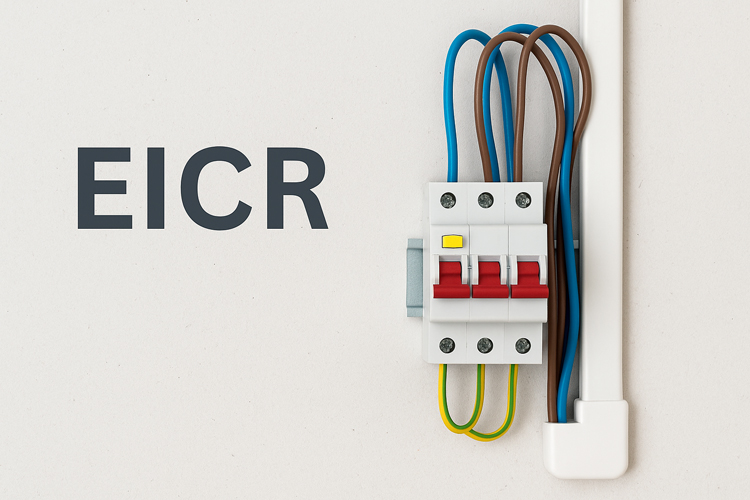Landlords: Is it Time to Update Your Electrical Installation Condition Reports?
Published on May 31, 2025 by Sarah Mac

If you’re a private landlord, now is the time to check whether your properties are due for an Electrical Installation Condition Report (EICR) renewal.
Five years ago, in June 2020, the Government introduced new electrical safety regulations requiring EICRs for all new tenancies in England. A year later, the rules were extended to cover all existing tenancies too. That means virtually every EICR in the private rented sector will need to be renewed between now and March 2026.
So, is your paperwork up to date? If you’re not sure, here’s what you need to know—and why it pays to act sooner rather than later.
What is an EICR and why is it important?
An EICR is a formal document produced by a qualified electrician following an inspection of a property’s electrical installation. It’s a safety check that assesses the condition of:
- Fixed wiring
- Fuse boards (consumer units)
- Plug sockets
- Light fittings
- Any other permanent electrical features, such as extractor fans
The report will flag any faults or hazards and classify them based on the level of risk. These could include worn cabling, overloaded circuits, or outdated fuse boxes. The aim is to prevent electric shocks, fires, and other potentially serious incidents.
If the EICR identifies issues, landlords must carry out any remedial work within 28 days (or sooner, if the report specifies). They must also obtain written confirmation that the work has been completed to the appropriate standard.
The five-year rule and the renewal rush
Under the Electrical Safety Standards in the Private Rented Sector (England) Regulations 2020, landlords must ensure their properties are inspected at least every five years. In reality, that means arranging a new EICR before the current one expires.
Because the legislation was phased in – starting with new tenancies in June 2020 and extending to all tenancies by April 2021 – many landlords now face a ticking clock.
If you started a new tenancy in June 2020, the five-year deadline lands this month. If you applied the regulations to an existing tenancy in April 2021, your renewal date will fall early in 2026. Either way, now is the time to get ahead of the curve.
The risks of ignoring it
Failing to renew your EICR on time can be costly. Local authorities have the power to issue fines of up to £30,000 for non-compliance. You could also find yourself unable to serve a valid Section 21 notice, which may limit your ability to regain possession of your property if needed.
But legal compliance is only part of the story. Keeping your electrical installations in safe working order also protects your tenants – and your investment.
Unsafe electrics are a leading cause of domestic fires in the UK. A valid EICR helps ensure your property meets basic safety standards, reducing your exposure to costly damage or injury claims.
Booking your next EICR
If your current EICR is nearing expiry – or if you’re not sure when it was last done – now’s the time to check.
Make sure the inspection is carried out by a qualified and competent professional (usually a NICEIC-registered electrician). Once the report is complete, keep a copy for your records and supply one to your tenants within 28 days. You’ll also need to provide it to your local authority if requested.
If remedial work is required, arrange it promptly and retain written evidence of completion.
Stay ahead of the deadline
The earlier you book your EICR, the more control you have. Leaving it until the last minute risks delays – especially as thousands of other landlords are trying to do the same over the coming months.
Just as you would not wait until a tenancy ends to check in on your property’s condition, do not wait for a compliance deadline to check on your electrics.
How mid-term inspections can help
Mid-term inspections are an ideal opportunity to review the general condition of your property between tenancies. At SRP Inventories, we routinely carry out mid-term visits for landlords looking to stay on top of maintenance issues.
Although a mid-term inspection is not a substitute for an EICR, it can be a useful way to spot any signs of wear and tear that might affect your electrical installation – for example, overloaded sockets, broken fittings, or DIY alterations by tenants.
We can highlight these concerns in your report and, if needed, recommend further investigation by a qualified electrician. It’s all part of our goal to help landlords stay compliant, safe, and informed.
EICR responsibilities – final thoughts
An up-to-date EICR is not just a box to tick. It’s an essential part of your legal responsibilities as a landlord—and a vital tool in protecting your tenants and property.
So if your report is due for renewal, do not put it off. Schedule your inspection today, and stay safely within the law.
At SRP Inventories, we are here to support you with all aspects of property compliance – from mid-term inspections to check-outs and damage reports. While we are not qualified to carry out EICRs ourselves, we can help you stay organised, aware, and ahead of your legal obligations.

